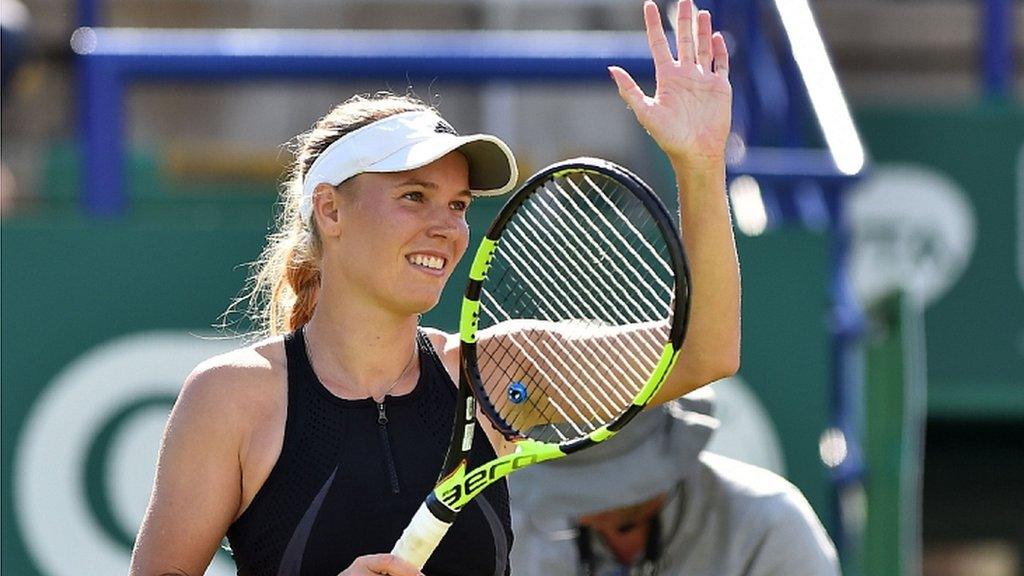Wimbledon 2017: Why Cilic has a chance against Federer - Henman
- Published
Watch: Federer's masterclass against Berdych
Wimbledon 2017 on the BBC |
|---|
Venue: All England Club Dates: 3-16 July Starts: 11:30 BST |
Live: Coverage across BBC TV, BBC Radio and BBC Sport website with further coverage on Red Button, Connected TVs and app. Click for full times. |
Roger Federer will try to win the Wimbledon men's title for a record eighth time when he plays Marin Cilic in Sunday's final.
Federer, 35, will become the oldest champion at SW19 since the Open era began in 1968 if he overcomes 28-year-old Croat Cilic on Centre Court.
The Swiss superstar is looking to secure a 19th Grand Slam title against a man who has just one - the 2014 US Open - to his name.
But will it be as straightforward as many expect? Four-time Wimbledon semi-finalist and former British number one Tim Henman tells BBC Sport why Cilic could spring a surprise.
Roger Federer beats Marin Cilic in five-set thriller
'Cilic should have beaten him here last year'
Cilic led Federer by two sets to love and had three match points in the fourth set of their Wimbledon quarter-final last year, before Federer triumphed in five sets. Federer has won six of their seven meetings since 2008.
Henman: Federer is the favourite but Cilic definitely has a chance. To put it into context, I would say if they played 10 times I think Cilic could win twice - well, maybe two and a half times.
He came very close to beating Federer here last year - and he should have won that match.
Cilic did beat him at the US Open, on his way to winning that title in 2014, and I think it is also in his favour that he has been in a Grand Slam final before.
If it was his first Slam final I think that would be an even bigger occasion for him to deal with mentally.
Yes, it is his first final at Wimbledon, and Roger has been there 10 times before, but Cilic has plenty of experience. He will know the crowd will be behind Federer but that won't worry him, and he is a very dangerous player.
Federer is fresh... but will fatigue be a factor for Cilic?
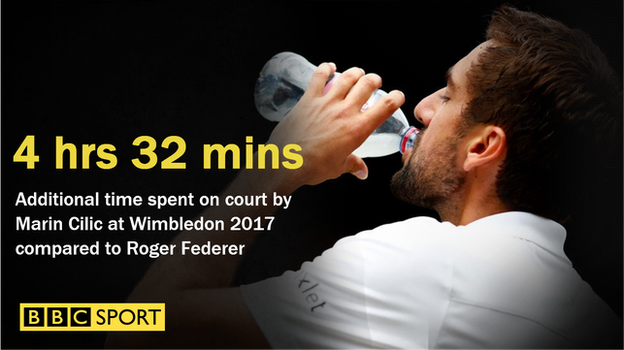
Marin Cilic has been on court for 14 hours and 28 minutes in his six matches at Wimbledon so far, compared to just nine hours and 56 minutes by Federer. The seven-time champion has not dropped a set on his way to the final and has only had one match that has lasted more than two hours - his semi-final against Tomas Berdych. The only time Federer has spent fewer minutes on court on his way to his 10 previous Wimbledon finals was in 2006 (nine hours and 11 minutes) when he beat Rafael Nadal in the final.
Henman: I don't think fatigue will make a difference here. When you take into account that it is the final and the adrenalin rush that Cilic will get from being in such a huge match, I don't see him being tired.
I think who wins is going to boil down more to who is going really dominate with their serve and attacking baseline play.
If Cilic is going to have a chance, I think that is where he really needs to be super-aggressive from the back of the court and try to take Federer's time away to stop him dictating points.
Federer serve will be hard to break down
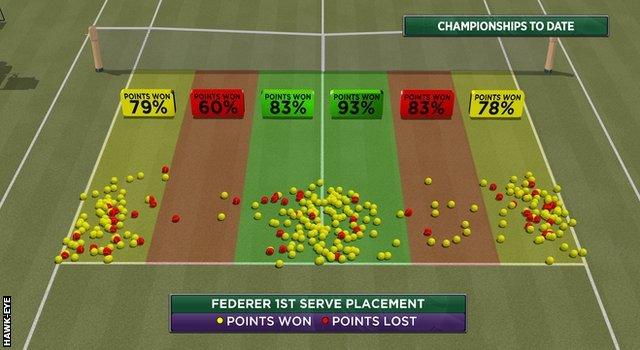
Federer's slice serve down the T into the advantage court (left in the graphic above) has been particularly effective but his serve down the T on the deuce court has been hugely successful and he has won 93% of the points when he has gone down there.
Henman: Serve is such an important factor in Federer's game.
He has only been broken four times in 79 service games at the tournament so far and, when you are holding serve so comfortably, that is such a great platform to free you up to be more aggressive in your return games.
Cilic has done well returning serve on his way to the final - has won more break points than any other man at Wimbledon this year - 26.
The challenge for him on Sunday is to find a way of adding to that total against someone as good as Federer.
Analysis from Roger Federer's win against Thomas Berdych
We have not seen Federer's serve under pressure very often at this tournament, but he showed in his semi-final against Tomas Berdych how he can respond when it does happen.
He faced break points at 15-40 at 3-3 in the third set but responded with a series of aces that saw him hold. Less than 15 minutes later, he was through.
Cilic has to attack whenever he can
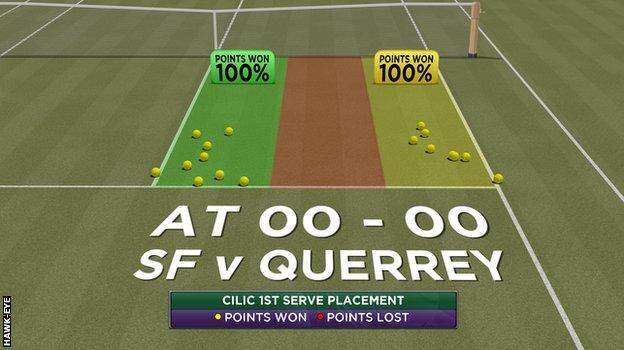
17/17: Cilic did not drop a point on his first serve in any of the first points in his service games of his semi-final win over Sam Querrey, which meant he was always on the front foot. On his second serve, he won four of the six first points
Wimbledon 2016 - Average return speeds | ||
|---|---|---|
Player | First serve returns | Second serve returns |
Roger Federer | 55mph | 62mph |
Marin Cilic | 63mph | 74mph |
Henman: Cilic is a tall guy with long arms and a very big reach so he is able to get a lot of serves back in play, and be aggressive about it too - particularly against second serves.
He has to do that against Federer, every time he gets a look at a second serve.
It will be harder for him to do that on Sunday than in any of his six matches here so far, because Federer has got a great second serve too, but Cilic has to attack him whenever he gets the chance.
Serve-volleying could keep Federer guessing

17/17: Cilic did not drop a point on his first serve in any of the first points in his service games of his semi-final win over Sam Querrey, which meant he was always on the front foot. On his second serve, he won four of the six first points
Henman: Cilic's serve is one of his main weapons and following it into the net sometimes would give Federer something different to deal with.
Federer is very good at blocking the ball back but, if you are serving big, then you know a lot of the time that is all he is going to do.
Wimbledon 2017: Marin Cilic beats Sam Querrey
I was amazed at one of the statistics I saw about Berdych after he had been beaten by Federer - the Czech had served 394 first serves at the tournament and had only come to the net 11 times after it.
That is staggering when you have got as much power as he does, and I definitely think that if Cilic can serve and volley once a game just to keep Federer guessing, it could be an important tactic.
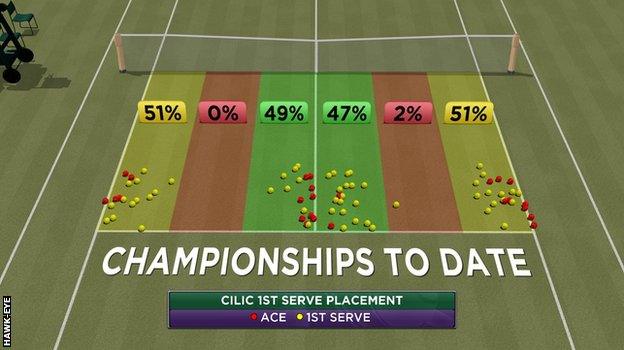
Cilic's serve has remained reliable throughout The Championships - he has been broken 10 times in 99 service games. He showed good variety during his semi-final win over Sam Querrey, mixing wide deliveries with serves down the T in both courts.
'I've given up being surprised by what Federer does'
Federer is playing in his 11th Wimbledon final, 14 years after his first. He was last at this stage in 2015, when he lost to Novak Djokovic. Before winning the 2017 Australian Open in January, he had not won a Grand Slam since his last Wimbledon triumph in 2012.
If Federer does win Wimbledon for an eighth time, it is a massive achievement in the same realms as Rafael Nadal winning his 10th French Open title last month.
When you think that, when Federer turned 35 last August, he was injured and did not play again for the rest of the year, it did not look like he would be adding to his 17 Slams.
Oldest man to reach a Grand Slam final in the Open era (since 1968) | ||
|---|---|---|
Player | Age | Grand Slam |
1. Ken Rosewall | 39 years, 310 days | 1974 US Open |
2. Ken Rosewall | 39 years, 246 days | 1974 Wimbledon |
3. Ken Rosewall | 37 years, 62 days | 1972 Australian Open |
4. Mal Anderson | 36 years, 306 days | 1972 Australian Open |
5. Ken Rosewall | 36 years, 73 days | 1971 Australian Open |
*6. Roger Federer | 35 years, 342 days | 2017 Wimbledon |
He came back to win the Australian Open and if he was to win Wimbledon on Sunday then he will have won both the Slams he has played this year. I don't think anyone saw that coming.
But I don't get surprised by what Roger does anymore - I've said that enough times down the years, that I've given up being surprised by him. I am just amazed.
What he and Nadal have done this year has turned the clock back five years in the men's game, and they continue to be incredible to watch.
Oldest man to win a Grand Slam final in the Open era (since 1968) | ||
|---|---|---|
Player | Age | Grand Slam |
Ken Rosewall | 37 years, 62 days | 1972 Australian Open |
Ken Rosewall | 36 years, 73 days | 1971 Australian Open |
Ken Rosewall | 35 years, 315 days | 1970 US Open |
Roger Federer | 35 years, 174 days | 2017 Australian Open |
Andres Gimeno | 34 years, 307 days | 1972 French Open |
Alerts, Live Guide & MySport |
|---|
My Sport: Sign up to follow all the tennis news |
- Published15 July 2017
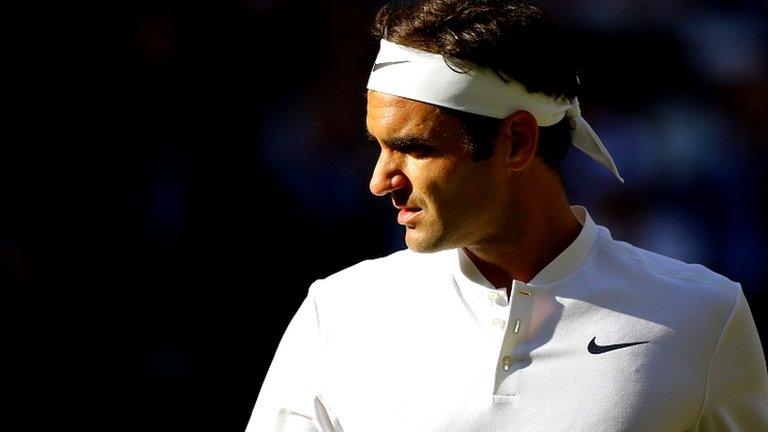
- Published30 June 2017
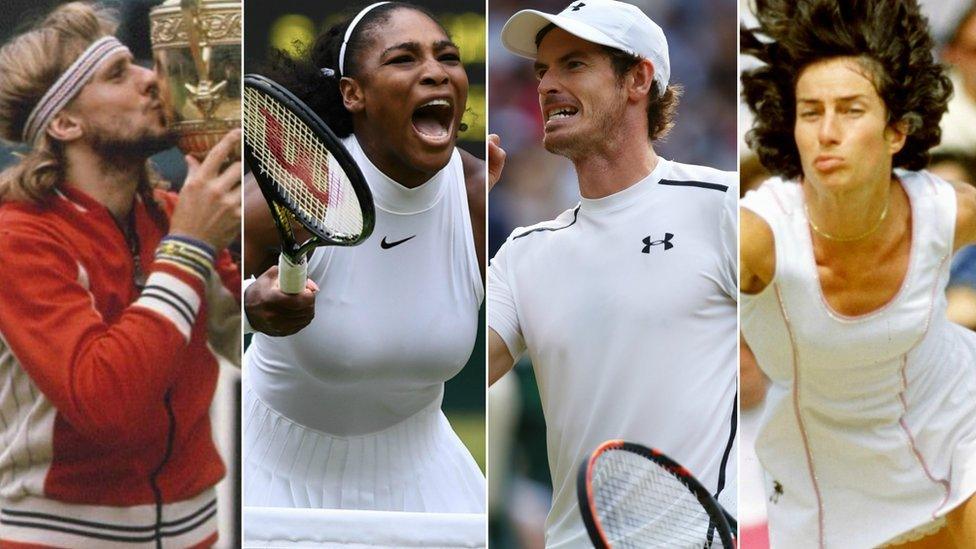
- Published24 June 2018
